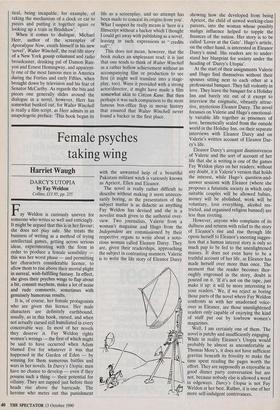Female psyches taking wing
Harriet Waugh
DARCY'S UTOPIA by Fay Weldon Collins, f13.95, pp. 235 Fay Weldon is curiously uneven for someone who writes so well and enticingly. It might be argued that this is in her favour; she does not play safe. She treats the business of writing as a method of trying intellectual games, getting across serious ideas, experimenting with the form in order to produce a female sensibility this was her worst phase — and permitting her characters considerable licence, to allow them to rise above their mortal plight in surreal, wish-fulfilling fantasy. In effect, she gives their psyches wings to flap about a bit, commit mayhem, make a lot of noise and rude comments, sometimes with genuinely humorous results.
It is, of course, her female protagonists who are given this licence. Her male characters are definitely earthbound, usually, as in this book, cursed, and when not actually cursed still humiliated in every conceivable way. In most of her novels they deserve it. Fay Weldon rights women's wrongs — the first of which might be said to have occurred when Adam blamed Eve for whatever it was that happened in the Garden of Eden — by winning for them numerous battles and wars in her novels. In Darcy's Utopia, men have no chance to develop — even if they possess such a thing — their potential for villainy. They are zapped just before their heads rise above the barricade. The heroine who metes out this punishment with the unwanted help of a beautiful Pakistani militant witch is variously known as Apricot, Ellen and Eleanor.
The novel is really rather difficult to describe without making it seem unneces- sarily boring, as the presentation of the subject matter is as didactic as anything Fay Weldon has devised and she is a novelist much given to the authorial over- view. Two journalists, Valerie from a woman's magazine and Hugo from the Independent are commissioned by their respective organs to write about a noto- rious woman called Eleanor Darcy. They are, given their readerships, approaching the subject in contrasting manners. Valerie is to write the life story of Eleanor Darcy showing how she developed from being Apricot, the child of unwed working-class parents, into the woman whose possibly malign influence helped to topple the finances of the nation. Her story is to be called 'Lover at the Gate'. Hugo's article, on the other hand, is interested in Eleanor Darcy's mind. His readers are to under- stand her blueprint for society under the heading of `Darcy's Utopia'.
At the start of their assignments Valerie and Hugo find themselves without their spouses sitting next to each other at a professional banquet. They fall violently in love. They leave the banquet for a Holiday Inn and barely stir out of it except to interview the enigmatic, vibrantly attrac- tive, mysterious Eleanor Darcy. The novel focusses on Valerie and Hugo's emotional- ly variable life together as prisoners of love, hermetically sealed from the outside world in the Holiday Inn, on their separate interviews with Eleanor Darcy and on Valerie's written account of Eleanor Dar- cy's life.
Eleanor Darcy's arrogant dismissiveness of Valerie and the sort of account of her life that she is writing is one of the games Fay Weldon plays on her readers: without any doubt, it is Valerie's version that holds the interest, while Hugo's question-and- answer sessions with Eleanor (where she proposes a futuristic society in which only suitable couples will be allowed babies, money will be abolished, work will be voluntary, love everything, alcohol res- tricted, and organised religion banned) are less than riveting.
However, anyone who complains of its dullness and returns with relief to the story of Eleanor's rise and rise through life opens herself to Eleanor's sneering sugges- tion that a human interest story is only so much pap to be fed to the unenlightened masses. It does not even have to be a truthful account of her life, as Eleanor has made herself over more than once. The moment that the reader becomes thor- oughly engrossed in the story, doubt is poured on it. 'If it's not on the tape, just make it up: it will be more interesting to your readers.' We, if we reject as boring those parts of the novel where Fay Weldon confronts us with her unadorned voice- over as Eleanor, are those unenlightened readers only capable of enjoying the kind of stuff put out by lowbrow women's magazines.
Well, I am certainly one of them. The novel is patchy and insufficiently engaging. While in reality Eleanor's Utopia would probably be almost as uncomfortable as Thomas More's, it does not have sufficient gravitas beneath its frivolity to make the time spent reading the pages worth the effort. They are supposedly as enjoyable as good dinner party conversation but are not, because nobody else is allowed a word in edgeways. Darcy's Utopia is not Fay Weldon at her best. Rather, it is one of her more self-indulgent contrivances.


























































 Previous page
Previous page